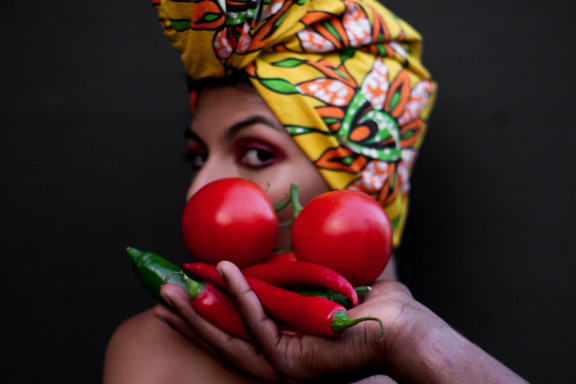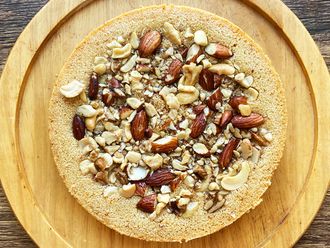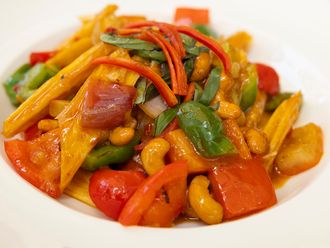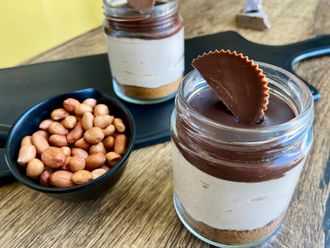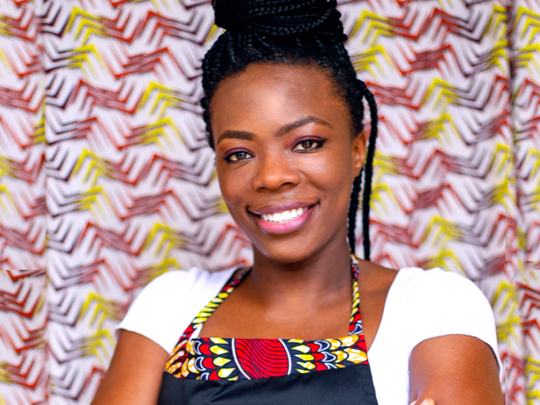
Saying Gbemi Giwa loves food would be doing a disservice to that love affair.
In her own words, the wellness blogger is obsessed with food. Fanatical about it. She creates and tastes every day. She spends days cooking up and mixing up different ingredients, a touch of her Nigerian roots brushing through everything. She’s always experimenting with different diet plans, pushing her body further — a month of being vegan, a week of paleo, two days of intermittent fasting. She runs a social media business with her sister that works primarily with food clients. Oh, and she’s just opened F&B concept Catfish in Kitchen Nation in Business Bay, an incubator space that rents out spots for different food concepts.
For someone who hated cooking growing up, this is quite an intense, unlikely pairing.
Gbemi laughs when I mention this.
“I remember a big part of my childhood was cooking for my dad. In Nigeria you needed to know how to cook and clean, or you weren’t marriage worthy,” she says. “He wouldn’t eat with us, as the man was this sort of king of the house, but every time we had to cook for him it would be this big stressful process and I used to loathe it so much. So when I moved to the UAE for university, I was so happy to not have to cook.”
Funny how that turned out, but Gbemi seems to have come full circle with food — only this time she gets to explore it on her own terms. But those early forced cooking sessions would soon go on to mould so many aspects of her life, forming both a passion and a career.
The 24-year-old moved to the UAE when she was just 16. What started off that journey? “We’re 11 siblings, a huge family, and in the summers we used to vacation together. And one summer, 2008, we came to Dubai. My mum and dad loved it and said ‘you’re going to go to school here,’” she says.
And that move across more than 10,000km was what got her cooking again. In university in Sharjah, she suddenly went through a phase where she was insecure about her body. She’d always loved eating, but she’d also been active all her life.
“But I was ordering take out all the time here,” she says. “I was given Dh1,500 pocket money, and I’d spend a whopping Dh1,300 buying food.”
“One day I just stopped and thought, what exactly is all this junk I’m eating. I started missing home food. And one night for a potluck dinner I tried making some of it, and realised I could — the instincts were there, if not the memory.”
Soon the Nigerian community in university started requesting her to cook up favourites; a jollof rice here, a bean and yam porridge there. “And they would ask me for a recipe, and I’d be at a loss because I didn’t have a recipe, I was just cooking the way my mum had taught me.”
That lack of answers brought about the next big stride in her life; her hugely popular blog, DubaiFitFoodie.com. It started as a recipe-sharing platform. Then she started experimenting. The one year she’d spent in Dubai had already altered her palate, which meant unknowingly she was making recipes that were Nigerian-inspired more than being wholly Nigerian.
Gbemi had found a whole new world of food.
And it was all about the food at first — healthy Nigerian ones. The fitness bit came later — she started creating workouts, doing dance tutorials. “At that point I had lived in the UAE about three years, but all my friends were Nigerian, I was only in touch with friends from back home. I didn’t realise there was an audience in the UAE for the content my blog offered up. When that started happening, it was all new to me, and so exciting.”
That was also when she first started recognising the power of African food. She’d never been able to cut carbs as she’d grown up on an African diet, which is big on carbs. But the wellness scene demanded a diet of chia seeds and quinoa, things she’d never eaten. “And initially I thought what I was eating wasn’t healthy. Then I did my own research. And I soon realised African cuisine is healthy.
“Take the ever-popular kale. We used to eat its equivalent, amaranth, in Nigeria. And I found out that it’s so much better quality-wise than kale.”
She kept up that momentum, and is now on an 80 per cent plant-based diet. “Going vegan for a while helped me know more about food. And I still very strongly believe in plant-based eating. Meat is hard to digest. My skin’s never so good as when I’m vegan. But I know it can be quite time intensive. I don’t like eating out of a fridge after 2 days, and it’s difficult to keep getting fresh food.”
But for all its amaranth, African cuisine, which of course is an umbrella term, with so many regions and so many diverse tastes — still suffers from perceptions of being too heavy, too oily, too spicy. A home-cooking of sorts.
Gbemi, however, associates very different words with it. “There’s so many amazing key flavour palettes. Like spicy. With my West African cooking for example, we cook a lot with scotch bonnet pepper, which is spicy but has an aroma — and a warm feeling — you don’t get from any other pepper. We do bitter, with our green leaves. We do sour, with our limes and lemons, we do fruity like guava, tropical such as pineapple, mango.”
She doesn’t disagree that the cuisine as it existed isn’t suited to 2018 tastes. “Back home we take off our buttons to eat. That cuisine with its lack of portion control is meant for the farmers, with all their heavy manual labour, walking 20km a day. Not so much with our desk jobs.”
Catfish reflects this. The menu is split 40-40-20, of veg, protein and carbs. I ask if she’s sacrificed on the flavours to keep it low calorie, but she instead says she’s gone big on the flavours. “It is still traditional African, but more mainstream, more with a wellness twist suited to the modern world. There’s African greens and herbs, be it fresh or sauteed. There’s grilled chicken or beef, there’s jack fruit and beans. Yesterday I created a plantain pancake.”
Food trends
Many food trend predictions have cited African food as the next big thing. Gbemi’s face lights up as I say this. “About time! I’ve worked around food a long time and seen the trends go up and down… paella, poke, Peruvian. Our continent as a whole demands attention. Across Africa food is eaten in different ways. What’s popular in the East might not be in the South. But the one thing we have in common is strong and bold flavours, slow cooking techniques, steaming. These are actually healthy ways of eating.”
She wants to change the fact that African food is underrepresented in Dubai. It’s no secret that the few places that serve the cuisine here range from either a shabby spot where you can only go on a cheat day, or a fine dining one where you can only go on pay day. “Yes, there’s a huge gap of everyday African food,” Gbemi says. “I want more people to get to know it. Like jollof, which is huge in London, and I want it to be huge in Dubai. It is 1 million times better than Mexican red rice, which everyone is plumping for now. We do not play with jollof in Africa. We have YouTube wars on it — who serves better jollof, Ghana or Nigeria?”
She’s gone for an interpretation for Catfish, a jollof quinoa, which average Nigerians would scoff at, but she says is more wholesome and flavourful. She’s not afraid to admit that she’s quite apprehensive about all the new twists she’s introducing. “It’s different, so I want to know what people think. I’ve noticed that what’s spicy for everyone else isn’t half as spicy for me,” she laughs.
It’s sort of an odd name — Catfish. “It was dad’s favourite fish,” Gbemi says, pausing. Her father passed away from cancer a week before this interview. “I didn’t realise it at the time the name popped into my head. But when dad got sick, it felt right for me to keep Catfish as a homage to him.”
Her dad’s illness gave her even more of a motive to promote the fact that food can heal. She’s consulted with a naturopath in Nigeria for Catfish’s entire menu. “In Africa herbs are a huge part of a cure. Like papaya as a cure for constipation, and various elixirs and potions of herbs cooked and boiled, called agbo, that work for wellness, colds, body pain… But no one knows of the power in these foods. I can’t wait to introduce all this to the market.”
She recounts the story of how as a child she drank dishwashing liquid “for the fun of it” and her mum force-fed her palm oil. “It counteracted the poison. And for coughs we used to take palm oil and sugar, and soon we’d be fine. The research on all this is still ongoing, and I love all the attention there is now as people haven’t cared much before. Even in the fitness world, you have so many prominent Africans. And that strength can be linked back to the food.”
In two months she’s starting a Catfish juice line. Then next she wants to do a retail line, introducing African ingredients here in supermarkets. She wants to support farmers back home, and a farmer’s collective in Nigeria is supplying her with baobab and moringa. At Catfish every dish has an African superfood highlighted. So there’s baobab jollof rice and in vegan bowls there’s moringa bean fritters. She wants to be able to give farmers money to grow food, buy the food back from them, process it in a Catfish plant in Nigeria, then export it to Dubai and around the world.
Besides spreading the culture, she wants to give back to the culture.
“Catfish is my money, my sweat, my tears. I have no work life balance anymore. It’s all late nights and early mornings. It’s all hustling and struggling. I quit my job with this beautiful dream of having my own company and my own hours, but the reality is I’m working harder than I ever did. I’m just feeding off my own energy.”
It’s an energy she’s using to push the African movement off the ground and get it soaring. And if it works, Dubai should get ready for some big and bold flavours from what’s been described as the last great untapped cuisine.



